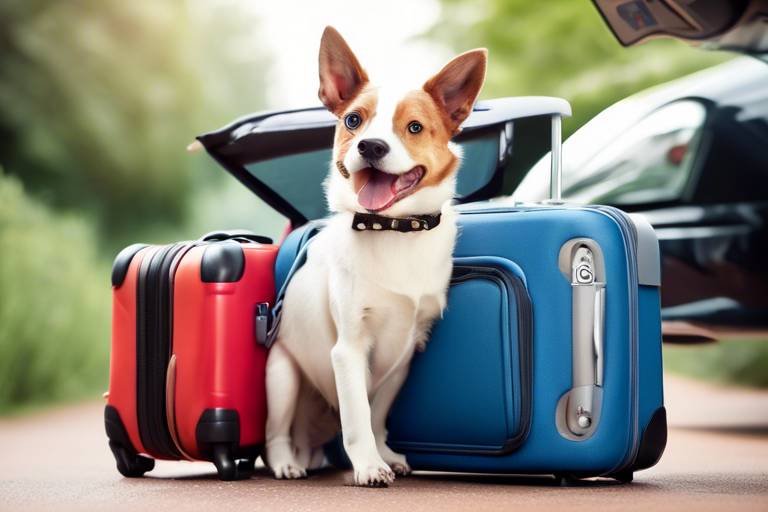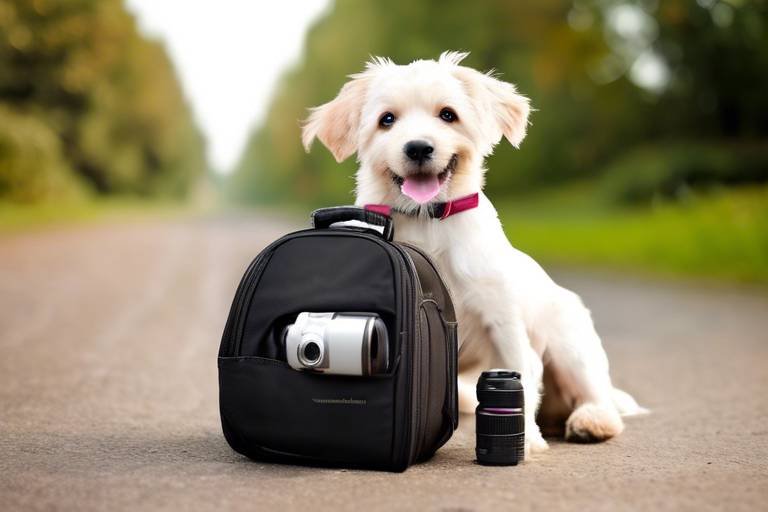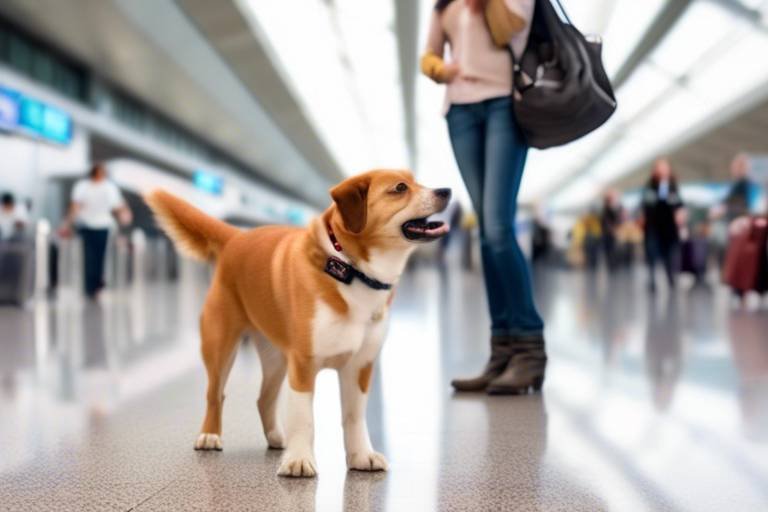The Importance of Understanding Pet Travel Laws
Traveling with your furry friend can be one of the most rewarding experiences, but it can also turn into a logistical nightmare if you're not aware of the various pet travel laws that govern your journey. Whether you're planning a weekend getaway or a cross-country move, understanding these regulations is crucial for ensuring both you and your pet have a safe and enjoyable trip. Imagine arriving at your destination only to find out that your pet doesn’t meet the local health requirements or, worse, facing hefty fines and quarantine. Yikes! That's not the kind of vacation anyone dreams of.
Pet travel laws can vary widely not just from country to country, but also from state to state. This means that as a responsible pet owner, you need to do your homework and stay informed about the specific regulations that apply to your travel route. For instance, did you know that some states require proof of certain vaccinations before allowing pets to enter? Or that others have strict quarantine rules? These are just a few reasons why understanding pet travel laws is not merely a suggestion but a necessity.
Moreover, being aware of these laws can help you avoid unnecessary stress and complications during your travels. Picture this: you’ve packed your bags, loaded up the car, and are ready to hit the road with your beloved pet. Suddenly, you’re stopped at a border checkpoint and asked for documentation that you didn’t know you needed. The last thing you want is to be turned away or, even worse, forced to leave your pet behind. By familiarizing yourself with pet travel laws, you can ensure a smooth journey and create wonderful memories without the fear of legal repercussions.
In this article, we will dive deep into the various aspects of pet travel laws, including the differences between domestic and international travel regulations, state-specific laws, vaccination requirements, and much more. Our goal is to equip you with the knowledge you need to navigate the sometimes murky waters of pet travel laws so that you can focus on what truly matters: enjoying your time with your four-legged companion!
- What documents do I need for traveling with my pet? - Generally, you will need a health certificate and proof of vaccinations. Always check specific requirements for your destination.
- Are there specific airlines that are more pet-friendly? - Yes, some airlines have better reputations for accommodating pets. Research and read reviews before booking your flight.
- What should I do if my pet needs to be quarantined? - Be prepared with necessary supplies and understand the regulations of the place you are traveling to. It's best to minimize the risk of quarantine by ensuring all documentation is in order.

Overview of Pet Travel Laws
Understanding the basic framework of pet travel laws is crucial for any responsible pet owner. Just like you wouldn't embark on a road trip without checking your vehicle, you shouldn't travel with your furry friends without knowing the laws that apply to them. These regulations are designed to ensure the safety and well-being of pets during their journeys. They can vary widely based on your destination, whether you're traveling across state lines or heading to another country.
Compliance with these laws is essential not just for your peace of mind, but also to avoid potential legal issues that could arise during your travels. Imagine arriving at your destination only to find out that your beloved pet doesn't meet the necessary health requirements or that you forgot to bring crucial documentation. This can lead to delays, extra costs, or even the possibility of being turned away. It's a scenario no pet owner wants to face!
In the United States, the Department of Agriculture and various state agencies oversee pet travel regulations. These laws generally cover aspects such as vaccination requirements, quarantine protocols, and transportation guidelines. It’s important to note that while some regulations are standardized, many are unique to each state, which can create a patchwork of rules that pet owners must navigate. For instance, while one state may require a rabies vaccination, another might have additional requirements for specific breeds or species.
Moreover, the importance of compliance cannot be overstated. Not only does it ensure the safety of your pet, but it also protects public health and prevents the spread of zoonotic diseases. This is why staying informed about the regulations of your travel route is paramount. In many cases, local laws can even dictate what types of pets are allowed in public spaces, such as parks and accommodations.
To give you a clearer picture, here’s a simple table summarizing some key aspects of pet travel laws:
| Aspect | Details |
|---|---|
| Vaccination Requirements | Varies by state; rabies vaccines are commonly required. |
| Quarantine Regulations | Some states require pets to be quarantined upon arrival. |
| Transport Regulations | Specific guidelines for airlines, trains, and road travel. |
As you prepare for your journey, remember that **knowledge is power**. Familiarizing yourself with the pet travel laws relevant to your trip can make the difference between a smooth, enjoyable experience and a stressful ordeal. So, before you pack your bags or your pet’s favorite toys, take a moment to research and understand the regulations that will govern your travels. This way, you can focus on what truly matters: enjoying precious moments with your furry companion!

Domestic vs. International Travel Regulations
When it comes to traveling with our furry friends, understanding the differences between domestic and international travel regulations is essential. While both types of travel require planning and compliance with certain laws, the complexities can vary significantly. For instance, domestic travel within the United States typically involves fewer hurdles compared to international journeys. However, that doesn't mean it's a walk in the park! Each state has its own set of regulations, and being unaware of these can lead to unexpected challenges.
On the domestic front, pet owners must be aware of state-specific laws that can dictate everything from vaccination requirements to quarantine protocols. For example, some states may require proof of rabies vaccination, while others may have additional health certifications. It's a good idea to check the specific regulations of your destination state before you hit the road. This ensures that you and your pet are in compliance and can avoid any last-minute surprises.
On the other hand, international travel introduces a whole new level of complexity. Different countries have varying regulations regarding pet importation, which may include specific vaccination requirements and health certificates. Some countries even impose quarantine periods for pets upon arrival, which can be a significant inconvenience. Imagine arriving in a new country only to find out your beloved pet has to spend days in quarantine! To avoid such scenarios, it's crucial to research the destination country's pet travel regulations well in advance.
Here’s a quick comparison of the key differences between domestic and international pet travel regulations:
| Aspect | Domestic Travel | International Travel |
|---|---|---|
| Vaccination Requirements | Varies by state; typically rabies vaccination required. | Strict; often includes multiple vaccinations and health checks. |
| Documentation | Health certificate may be required. | Health certificate, vaccination records, and import permits often needed. |
| Quarantine | Rarely required. | Possible, depending on the country. |
| Transportation Options | Generally more flexible; cars, buses, and pet-friendly accommodations. | Limited; airlines and specific carriers must be chosen carefully. |
In conclusion, whether you're planning a quick weekend getaway or an international adventure, understanding the nuances of pet travel regulations is crucial for a smooth journey. Remember, knowledge is power! By staying informed and prepared, you can ensure that your travels with your pet are enjoyable and stress-free.
State-Specific Laws
When it comes to traveling with your furry companions, can significantly impact your journey. Each state in the U.S. has its own set of regulations regarding pet travel, which can include everything from vaccination requirements to quarantine protocols. Ignoring these laws can lead to unexpected detours and even hefty fines, making it essential for pet owners to be well-informed before hitting the road.
For instance, some states may require pets to have a rabies vaccination certificate, while others might have stricter rules regarding breeds considered dangerous. It's not just about keeping your pet safe; it's also about ensuring you comply with the law. Failure to adhere to these regulations can result in your pet being denied entry into a state or, worse, being quarantined.
To help you navigate these waters, here’s a quick overview of some common state-specific laws:
| State | Vaccination Requirements | Quarantine Regulations |
|---|---|---|
| California | Rabies vaccination required for dogs over 4 months | No quarantine unless rabies vaccination is not up to date |
| New York | Rabies vaccination required for dogs and cats over 3 months | Quarantine may be required for unvaccinated pets |
| Texas | Rabies vaccination required for all dogs and cats over 3 months | No quarantine unless showing signs of illness |
| Florida | Rabies vaccination required for dogs and cats | Quarantine may apply for pets from certain states |
As you can see, the regulations can vary widely. This is why it’s crucial to research the specific laws of each state you plan to visit. Additionally, consider checking with local veterinarians or pet organizations in the area for the most current information. These professionals can provide valuable insights and help you prepare for any potential challenges.
Also, keep in mind that some states may have additional requirements based on the breed of your pet. For example, certain breeds may be restricted or require special permits to enter. Always check local regulations to avoid any surprises at the state line!
In summary, understanding state-specific laws is not just a matter of convenience; it’s a crucial step in ensuring a smooth and enjoyable travel experience with your pet. By staying informed and prepared, you can focus on what truly matters: making memories with your beloved companion on the open road.
- What should I do if I find out about a law I wasn't aware of? It's best to contact local authorities or a veterinarian in that state for guidance.
- Are there any states that have more stringent requirements than others? Yes, states like Hawaii have very strict regulations due to their unique ecosystems.
- How can I ensure my pet's vaccination records are up to date? Regular visits to the vet and keeping a digital copy of records can help you stay organized.
Vaccination Requirements
When it comes to traveling with your furry friends, understanding is absolutely essential. Many states in the U.S. have specific regulations regarding which vaccinations your pet must have before they can travel. These rules are designed to protect not just your pet, but also other animals and the local ecosystem. So, what vaccinations are typically required? Let’s dive into some of the most common ones:
- Rabies: Almost every state mandates that pets be vaccinated against rabies. This vaccine is crucial as it protects against a deadly virus that can affect both animals and humans.
- Distemper: This is another common requirement. Distemper is a highly contagious viral disease that can be fatal, especially in puppies.
- Parvovirus: Particularly important for dogs, this vaccination helps prevent a severe and often deadly illness that affects the gastrointestinal tract.
- Bordetella: Often required for dogs, this vaccine protects against kennel cough, which can be easily transmitted in crowded environments.
Before you embark on your journey, ensure that your pet's vaccination records are not only up-to-date but also easily accessible. Many states require proof of vaccination to be presented at checkpoints or when you arrive at your destination. It’s a good idea to carry both physical copies and digital backups of these records. Just imagine arriving at a pet-friendly hotel only to find out you forgot to bring your dog's vaccination certificate—what a hassle!
Additionally, some states may have specific time frames for when vaccinations need to be administered before travel. For instance, a rabies vaccine might need to be given at least 30 days prior to your trip. Therefore, it’s wise to check the regulations not just for your home state, but also for your destination. A quick visit to your state’s agriculture department or the Centers for Disease Control and Prevention (CDC) website can provide valuable insights.
In conclusion, keeping your pet's vaccinations up-to-date is not just a legal requirement; it's a vital part of ensuring their health and safety while traveling. The last thing you want is for your pet to fall ill or face quarantine due to missing vaccinations. So, before you pack the treats and toys, make sure you have all the necessary paperwork in order—your pet will thank you for it!
Q: What should I do if my pet's vaccinations are not up-to-date?
A: If your pet's vaccinations are not up-to-date, it's best to schedule a visit with your veterinarian as soon as possible. They can provide the necessary vaccinations and ensure your pet is ready for travel.
Q: Are there any exceptions to vaccination requirements?
A: Some states may allow exemptions for pets with medical conditions or those that are too young for certain vaccinations. Always check local regulations and consult your veterinarian for guidance.
Q: How can I obtain proof of vaccination?
A: Proof of vaccination is typically provided by your veterinarian in the form of a vaccination certificate. Make sure to request this documentation during your pet's check-up.
Q: What happens if I travel without the required vaccinations?
A: Traveling without the required vaccinations can lead to serious consequences, including fines, quarantine of your pet, or being denied entry into certain states or facilities.
Quarantine Regulations
When it comes to traveling with pets, can be a significant hurdle that pet owners must navigate. These regulations vary not just from state to state but also from country to country. Imagine this: you’ve planned a fantastic getaway with your furry friend, only to discover that upon arrival, your pet must be quarantined for a period of time. This can lead to unexpected delays, additional costs, and a lot of stress for both you and your pet.
Quarantine is typically imposed to prevent the spread of diseases that could affect local animal populations, as well as to protect public health. For instance, if you’re traveling from a state or country where a particular disease is prevalent, the authorities may require your pet to undergo a quarantine period before they can freely roam in their new environment. This period can range from a few days to several weeks, depending on various factors such as the type of disease and the local laws.
To help you understand the specific regulations that may apply to your situation, here are a few key points to consider:
- Duration of Quarantine: The length of time your pet may need to be quarantined can vary widely. Some states may require only a few days, while others might enforce a longer period.
- Documentation: Having the right paperwork can make all the difference. Ensure you have up-to-date vaccination records and health certificates that comply with the regulations of your destination.
- Local Regulations: Always check the specific quarantine laws of the state or country you are traveling to. This information can often be found on government or veterinary websites.
Furthermore, if you’re planning to travel internationally, the stakes get even higher. Many countries have stringent quarantine laws that can be quite daunting. For example, some countries require pets to be vaccinated against rabies at least 21 days before travel, and failure to comply could result in mandatory quarantine upon arrival. In some cases, pets may even be denied entry altogether!
To summarize, understanding quarantine regulations is not just a matter of legality; it’s about ensuring the safety and well-being of your beloved pet. Planning ahead and being informed can save you from the headaches of unexpected quarantine periods. So, before you pack your bags and hit the road, make sure to do your homework!
Q: What should I do if my pet needs to be quarantined?
A: If your pet needs to be quarantined, ensure you have all necessary documentation ready. Contact local authorities to understand the requirements and duration of the quarantine. It may also be helpful to have a trusted pet sitter or boarding facility ready to care for your pet during this time.
Q: How can I avoid quarantine when traveling with my pet?
A: To avoid quarantine, ensure that your pet is up to date on all vaccinations and that you have the required health certificates. Always check the specific rules of your destination before traveling.
Q: Are there any exceptions to quarantine regulations?
A: Some states or countries may have exceptions, especially for service animals or pets that have been previously vaccinated and are traveling from low-risk areas. Always verify with local authorities.
International Travel Considerations
Traveling abroad with your furry friend can be an exhilarating experience, but it also comes with its own set of challenges and regulations. Understanding the for pets is essential to ensure a smooth journey. Each country has its own specific requirements, which may include health checks, vaccinations, and even quarantine protocols. Therefore, before you pack your bags, it's crucial to do your homework!
First off, let’s talk about documentation. Most countries require a health certificate issued by a licensed veterinarian, confirming that your pet is healthy and fit for travel. This document often needs to be issued within a specific time frame before your departure—usually within 10 days. Additionally, vaccination records are essential, especially for rabies. Some countries may require pets to be vaccinated at least 21 days prior to travel, while others may have a stricter timeline. Keeping these documents organized and accessible can save you from unexpected hiccups at customs.
Furthermore, it’s important to check if your destination country has any specific quarantine regulations. Some countries may require pets to undergo a quarantine period upon arrival, especially if they don't meet the vaccination standards. This can range from a few days to several weeks, depending on the country’s policies. To avoid any surprises, it’s wise to contact the embassy or consulate of your destination country for the most accurate and updated information.
Another aspect to consider is the mode of transportation. Not all airlines are created equal when it comes to pet travel. Some are more accommodating than others, offering pet-friendly cabins and specialized services. It’s advisable to book your tickets with an airline that has a good reputation for handling pets. Additionally, familiarize yourself with the airline's specific pet travel policies, including crate requirements and fees.
When preparing for international travel, it’s also a good idea to research pet import regulations specific to your destination. For instance, countries like Australia and New Zealand have stringent import laws that can include extensive testing and documentation. Understanding these regulations well in advance can help you avoid any last-minute scrambles and ensure your pet's safe arrival.
Lastly, consider the cultural attitudes towards pets in your destination country. In some places, pets are welcomed with open arms, while in others, they may face restrictions or even hostility. Knowing what to expect can help you navigate foreign environments more comfortably and ensure that your pet enjoys the trip just as much as you do.
| Country | Health Certificate Required | Rabies Vaccination | Quarantine Period |
|---|---|---|---|
| Australia | Yes | Yes, at least 21 days prior | Up to 30 days |
| United Kingdom | Yes | Yes, at least 21 days prior | No |
| New Zealand | Yes | Yes, at least 21 days prior | Up to 10 days |
| Japan | Yes | Yes, at least 30 days prior | Up to 180 days |
In summary, international travel with pets requires careful planning and adherence to various regulations. By being proactive and informed, you can ensure a stress-free and enjoyable experience for both you and your pet. After all, the world is a big place, and there are countless adventures waiting for you and your four-legged companion!
Q: What documents do I need to travel internationally with my pet?
A: You will typically need a health certificate from a veterinarian, vaccination records, and possibly additional paperwork depending on the destination country.
Q: Can I take my pet in the cabin with me?
A: This depends on the airline's policy. Some airlines allow small pets in the cabin, while others may require them to be transported in the cargo hold.
Q: What should I do if my pet needs to be quarantined?
A: If quarantine is necessary, make sure to have a plan for your pet's care during that time. Research the quarantine facilities ahead of time and understand the requirements for release.
Q: Are there countries where pets are not allowed?
A: Yes, some countries have strict regulations that may prohibit certain pets or require extensive documentation. Always check the specific laws of your destination.

Preparing for Travel with Pets
When it comes to traveling with our furry companions, preparation is everything. Imagine gearing up for a road trip without packing your essentials—chaos, right? The same goes for traveling with pets. You'll want to ensure that your pet is not only comfortable but also safe and legal during your journey. Taking the time to prepare can make all the difference, turning a potential nightmare into a delightful adventure. So, what do you need to consider before hitting the road or boarding that plane?
First and foremost, documentation is crucial. Just like you wouldn’t travel without your ID, your pet needs specific paperwork to travel smoothly. This includes health certificates from your veterinarian, which confirm that your pet is fit for travel and up-to-date on vaccinations. Make sure to check the requirements of your destination, as some places may have different regulations. Keeping a folder with all necessary documents can help you avoid last-minute scrambles and potential issues at checkpoints.
Next up is choosing the right mode of transportation. Not all transportation options are equally pet-friendly. For instance, if you're flying, some airlines have specific pet policies that dictate how pets can travel—whether in the cabin or as cargo. Researching airlines that prioritize pet comfort can save you a lot of stress. If you're driving, consider your car's setup. Is your pet secure in a carrier or harness? Does your vehicle have enough space for them to move around comfortably? These factors can significantly impact your pet's travel experience.
Now, let's talk about packing. Just as you wouldn’t forget your favorite snacks or entertainment for the journey, your pet deserves the same consideration. Here’s a quick checklist of essentials to pack for your pet:
- Food and water bowls
- Enough food for the duration of the trip
- Leash and collar with ID tags
- Comfort items like a blanket or toy
- Any medications your pet may need
Having these items ready can help your pet feel more at home, even in unfamiliar surroundings. Plus, it minimizes the chances of forgetting something important that could lead to stress for both you and your pet.
Lastly, don't forget to consider your pet's temperament and health. Some pets may thrive during travel, while others may become anxious or stressed. If your pet has a history of travel anxiety, consult your veterinarian about possible remedies or calming aids. It's also a good idea to take your pet on shorter trips before the big journey to gauge how they handle travel and to help them get accustomed to the experience.
In summary, preparing for travel with pets involves a blend of proper documentation, choosing suitable transportation, packing the right items, and considering your pet's individual needs. By taking these steps, you can ensure that your adventure together is enjoyable and stress-free!
Q: What documents do I need to travel with my pet?
A: Essential documents include a health certificate from your veterinarian, vaccination records, and any necessary permits for international travel.
Q: Can I take my pet on a plane?
A: Yes, many airlines allow pets to travel in the cabin or as cargo, but it's important to check the specific airline's pet policy beforehand.
Q: How can I help my pet with travel anxiety?
A: Gradual exposure to travel, calming aids, and consultation with your veterinarian can help alleviate travel anxiety in pets.
Q: Are there pet-friendly hotels?
A: Yes, many hotels are pet-friendly. It’s best to call ahead and confirm their pet policy before booking your stay.
Essential Documentation
When it comes to traveling with your furry friend, having the right documentation is not just important; it’s absolutely essential. Imagine planning a fabulous getaway only to be stopped at the airport or border because you forgot a crucial health certificate. It can be a real nightmare! So, let's break down what you need to keep your travel smooth and stress-free.
First off, one of the most critical documents you'll need is a health certificate. This document, typically issued by a licensed veterinarian, verifies that your pet is healthy enough to travel and free of any contagious diseases. Most airlines and international borders require this certificate, so it’s best to get it within a specific timeframe before your trip—usually within 10 days. That way, you can ensure that your pet is in tip-top shape and meets all travel requirements.
Next, you’ll want to gather your pet’s vaccination records. These records should include details about all vaccinations your pet has received, especially rabies vaccinations, which are often mandatory for travel. Keeping these records up to date is crucial, as some states and countries have strict timelines for vaccinations. If your pet is overdue for a shot, it’s better to get it done before your trip rather than face the hassle of quarantine or denial of entry.
In addition to health certificates and vaccination records, you may also need to prepare a microchip registration document. Many places require pets to be microchipped as a form of identification. If your pet gets lost during travel, a microchip can be a lifesaver. Ensure that your microchip information is up to date and that you carry a copy of the registration details with you.
Lastly, don’t forget about any specific permits or import/export documentation that may be required for your destination. For example, certain countries have unique regulations regarding the importation of pets, including additional health tests or permits. Always check the official government website of the country you’re traveling to for the most accurate and up-to-date information.
To summarize, here’s a quick checklist of essential documentation for pet travel:
- Health Certificate
- Vaccination Records
- Microchip Registration
- Import/Export Permits (if applicable)
By ensuring that you have all of these documents in order, you can avoid unnecessary delays and complications, allowing you and your pet to enjoy your adventures together without a hitch!
Q: Do I need a health certificate for domestic travel?
A: While not always required for domestic travel, having a health certificate is still advisable, especially if you're flying or crossing state lines.
Q: What vaccinations are typically required for pet travel?
A: The rabies vaccination is commonly required, but other vaccinations may be necessary depending on your destination.
Q: How far in advance should I obtain a health certificate?
A: It’s best to get a health certificate within 10 days of your travel date to ensure it's still valid.
Q: What should I do if my pet needs medication during travel?
A: Always carry a sufficient supply of any medications your pet needs, along with a copy of the prescription, in case you need to refill it while traveling.
Choosing Pet-Friendly Transportation
When it comes to traveling with your furry friend, choosing the right mode of transportation can make all the difference in ensuring a smooth journey. Not all transportation options are created equal, especially when it comes to accommodating pets. Whether you're considering flying, taking a train, or hitting the road, each method has its own set of guidelines and comfort levels for your beloved companion. So, how do you decide what's best for you and your pet?
First, let's talk about air travel. If you opt for flying, it's essential to check the airline's pet policy well in advance. Some airlines allow pets in the cabin, while others may require them to travel in the cargo hold. Make sure your pet is comfortable in a suitable carrier that meets the airline's specifications. Additionally, book your flight during off-peak hours to minimize stress and ensure a smoother boarding process. Remember, your pet will be much calmer if the airport isn't bustling with crowds.
Next up is train travel. Many train services are becoming increasingly pet-friendly, allowing small pets to travel in the cabin with their owners. However, there are usually restrictions on size and breed, so it's crucial to check the specific rules of the train service you plan to use. Also, keep in mind that some trains may charge a fee or require a reservation for your pet. If your journey involves multiple train transfers, be sure to factor in the time needed for boarding and disembarking, as this can be a bit more hectic when traveling with a pet.
Now, if you're considering a good old-fashioned road trip, this can often be the most flexible and comfortable option for both you and your pet. You have complete control over your schedule, stops, and the environment. However, it’s important to plan your route with pet-friendly accommodations in mind. Many hotels and motels now welcome pets, but it's always wise to call ahead and confirm their policies. Also, make sure to pack your pet's essentials, such as food, water, a leash, and their favorite toys, to keep them comfortable during the journey.
Here’s a quick comparison table to help you visualize the pros and cons of each transportation method:
| Transportation Method | Pros | Cons |
|---|---|---|
| Air Travel | Fast, many airlines are pet-friendly | Stressful for pets, potential cargo hold travel |
| Train Travel | More space, often allows pets in cabin | Limited to small pets, may require fees |
| Road Trip | Flexible, pets can relax in their own space | Longer travel times, need to plan pet-friendly stops |
Ultimately, the best choice depends on your pet's personality and comfort level. Some pets thrive on the excitement of new experiences, while others may find travel overwhelming. Always consider your pet's needs and preferences when making a decision. And remember, regardless of how you choose to travel, keeping your pet calm and secure is the top priority!
Q: What should I do if my pet is anxious about traveling?
A: If your pet experiences anxiety, consult your veterinarian before traveling. They may recommend calming products or medications to help ease your pet's stress.
Q: Are there any restrictions on pet breeds for air travel?
A: Yes, some airlines have restrictions on certain breeds, especially those considered brachycephalic (like Bulldogs and Pugs). Always check the airline's policy before booking.
Q: How can I ensure my pet is comfortable during a long road trip?
A: Make frequent stops for bathroom breaks, provide plenty of water, and bring along familiar items like blankets or toys to help your pet feel at home.

Resources for Pet Travelers
When embarking on a journey with your furry friend, having access to the right resources can make all the difference. Pet travel can be a maze of regulations and requirements, but fear not! There are numerous tools, websites, and organizations dedicated to helping pet owners navigate these challenges with ease. First and foremost, consider visiting the American Kennel Club (AKC) website, which provides a wealth of information on pet travel laws, including state-specific regulations and tips for safe travel. It’s like having a travel buddy who knows all the ins and outs!
Another invaluable resource is the United States Department of Agriculture (USDA), particularly their Animal and Plant Health Inspection Service (APHIS) section. They offer detailed guidelines on international travel with pets, including necessary documentation and health checks. Imagine planning a trip without worrying about the paperwork—sounds dreamy, right?
Additionally, the Centers for Disease Control and Prevention (CDC) has specific guidelines for traveling with pets, especially when crossing borders. Their resources can help ensure that you’re compliant with health regulations, which is crucial to avoid any hiccups during your journey. Don’t forget to check out local state veterinary boards and their websites, as they often provide specific laws and requirements that can vary significantly from one state to another.
For those who prefer a more interactive approach, mobile apps like BringFido and PetFriendly can be lifesavers. These apps help you find pet-friendly accommodations, restaurants, and parks, ensuring that your travel experience is as enjoyable as possible for both you and your pet. Think of them as your digital travel guides, tailored specifically for pet owners!
To further assist you, here’s a quick reference table summarizing some essential resources for pet travelers:
| Resource | Description | Website |
|---|---|---|
| American Kennel Club (AKC) | Information on pet travel laws and regulations. | www.akc.org |
| USDA APHIS | Guidelines for international pet travel. | www.aphis.usda.gov |
| Centers for Disease Control and Prevention (CDC) | Health regulations for pet travel. | www.cdc.gov |
| BringFido | Find pet-friendly places and activities. | www.bringfido.com |
| PetFriendly | Search for pet-friendly accommodations. | www.petfriendly.com |
In summary, being well-informed is key when it comes to pet travel. Utilize these resources to ensure that your journey is smooth and enjoyable, allowing you to focus on making memories with your beloved pet rather than stressing over regulations and requirements. And remember, preparation is your best friend—just like your pet!
Frequently Asked Questions
- What are the basic pet travel laws I should be aware of?
Understanding pet travel laws is essential for a smooth journey. These laws can include vaccination requirements, health certificates, and regulations specific to each state or country. Familiarizing yourself with these rules helps ensure that your furry friend has a safe and legal trip.
- Are there different regulations for domestic and international pet travel?
Yes, absolutely! Domestic travel typically involves state-specific regulations, while international travel can introduce additional complexities like import permits and international health certificates. Always check the specific laws of your destination to avoid any surprises.
- What vaccinations do my pets need before traveling?
Vaccination requirements can vary by state and country, but common vaccinations include rabies and distemper. It's crucial to keep your pet's vaccination records updated and easily accessible, as you may need to present them during travel.
- What should I do if my pet needs to be quarantined?
If you're traveling to a location that requires quarantine for pets, it's best to prepare in advance. Research the specific quarantine regulations of your destination and plan for any potential delays in your travel itinerary.
- What essential documents do I need to travel with my pet?
Key documents typically include a health certificate from your veterinarian, proof of vaccinations, and any other required permits. Having these documents organized and ready can save you a lot of hassle during your travels.
- How can I find pet-friendly transportation options?
Look for airlines, trains, or buses that specifically cater to pet travelers. Many companies have pet policies that outline how to travel with your furry friend safely and comfortably. Always check their guidelines and book in advance to ensure availability.
- Where can I find resources to help me navigate pet travel laws?
There are many online resources available, including government websites, pet travel forums, and organizations dedicated to pet welfare. These can provide valuable information and updates on travel laws, making your planning process smoother.



















